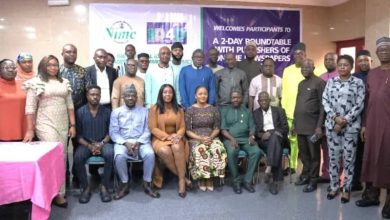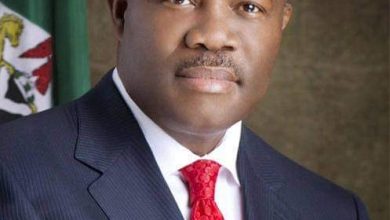
Again, the Nigeria tax environment has been given the shock treatment. A judge of the Federal High Court has ruled that the federal Inland Revenue Service (FIRS) can no longer collect and administer Value Added Tax (VAT) in Rivers State and by implication in other states of the federation. Assistant Editor Nduka Chiejina presents the views of two authorities on the judgment and what it means for VAT collection in the country going forward.
The judgment handed down by Justice Pam of the Federal High Court Port Harcourt stripping the FIRS of the duty of collecting Value Added Tax (VAT) and Personal Income TAX (PIT) has generated controversies with experts and professors pitching their arguments for and against the ruling.
Both sides agree that the judgment is in favour of and upholds the principle of true federalism which allows federating units the latitude to pursue their development with little or no interference from the government at the centre.
Justice Pam in his ruling said the constitutional powers and competence of the Federal Government was limited to taxation of incomes, profits and capital gains, which did not include VAT or any other species of sales, or levy other than those specifically mentioned in items 58 and 59 of the Exclusive Legislative List of the Constitution.
The court agreed with the Rivers State government that it was the state and not FIRS that was constitutionally entitled to impose taxes enforceable or collectable in its territory of the nature of consumption or sales tax, VAT, education and other taxes or levies, other than the taxes and duties specifically reserved for the Federal Government by items 58 and 59 of Part 1 of the Second Schedule of the 1999 constitution as amended.
The court, also declared that the defendants FIRS and the Minister of Finance were not constitutionally-entitled to charge or impose levies, charges or rates (under any guise or by whatever name called) on the residents of Rivers and any state of the federation.
The Rivers State government pleaded with the court to declare that, by virtue of the provisions of items 7 and 8 of the Part II (Concurrent Legislative List) of the Second Schedule of the constitution, the power of the Federal Government to delegate the collection of taxes could only be exercised by the state government or other authority of the state and no other person.
The Lead Lawyer to the state government, Donald Chika Denwigwe (SAN), told reporters that the case was all about the interpretation of the constitution in respect of the authority of the governments at the state and federal levels to collect certain revenue particularly VAT.
Speaking on the implication of the judgment, Denwigwe said: “In a summary, it is a determination that it is wrong for the Federal Government to be collecting taxes which are constitutionally reserved for the State governments to collect. So, in other words, the issue of Value Added Tax (VAT) in the territory of Rivers State and Personal Income Tax should be reserved for the government o
The Value Added Tax Act of 1999 states that VAT shall be administered and managed by the Federal Board of lnland Revenue and the Board may do such things as it may deem necessary and expedient for the assessment and collection of the tax and shall account for all amounts so collected in accordance with the provisions of this Act.
There is also the provision for the establishment and composition of the Value Added Tax Technical Committee which comprises of a chairman who shall be the chairman of the Federal Board of Inland Revenue; all directors in the Federal Inland Revenue Service; the legal adviser to the Federal Inland Revenue Service; a director in the Nigerian Customs Service; and three representatives of the state governments who shall be members of the Joint Tax Board.
The Act states that “the revenue accruing by virtue of the operation of this Act shall be distributed as follows-15 percent to the Federal Government; 50 per cent to the state governments and the Federal Capital Territory, Abuja; and 35 per cent to the Local Governments”.
Support for judgment
Former Commissioner of Finance, Imo State, Prof Uche Uwaleke said the judgment will encourage state governments to design policies that will attract investors to their states which in turn will give the states the leverage to impose taxes thus increasing their Internally Generated Revenue (IGR).
Uwaleke who is a Professor at Nasarawa State University, said: “VAT replaced sales tax it was something that was within the jurisdiction of the state during the time. Ideally it should be collected at the state level. If states are allowed to collect VAT many of them will be encouraged to develop that aspect of taxation as opposed to going to the tax pool to share.”
Uwaleke argued that “in view of the fact that a lot of the states are trying to beef up IGR, allowing them to collect and administer VAT will boost the IGR of states. As much as possible, we should find a way of devolving taxing powers and responsibility to subnational governments that is what true fiscal federalism is all about”.
The judgment he said “is in line with true fiscal federalism and any arrangement that gives the states more taxing power is consistent with federalism, I support the idea of empowering states. If states are allowed to collect VAT they will do well with their IGR. Taxing multinationals is within the jurisdiction of the federal government so it should continue to tax them”.
The argument that the federal government will make more money from the judgment than it is making now, Uwaleke said “holds a lot of water, when you consider the fact that the present arrangement is in favour of some states. If you allow them to generate VAT on their own, they don’t have enough consumption or activity levels to make money from VAT so when the federal government gets and shares, you now find some otherwise disadvantaged states getting something because of that horizontal formula.
“Ideally what should happen is that every state should be allowed to do that. Yes, let the federal government keep what they are getting and if they also think that these other states should be assisted one way or the other then maybe from those proceeds, they can be assisted what is important is to allow states to collect VAT on consumption done in their states”.
Another implication of the judgment Prof. Uwaleke said “is that VAT rate may not be universally applicable, it will now vary from state to state. The VAT is an incentive for states to grow their IGR, if you allow them to administer it you will find out that a lot of states will make a lot of money from VAT and depend less on statutory allocation”.
The money generated from VAT he said “will increase if that happens and if also allowed, the collection efficiency of the states will improve, its administration will improve. It will enable some states to deploy technology in ensuring that everything that should come in comes in”.
Uwaleke added that there is also the ethical angle. “Why should Kano for example and some other states why should they be benefiting from VAT from alcohol. So, when you now allow Kano to collect tax, Kano will not impose VAT on those commodities like alcohol and those things that are haram. It will enable sharia compliant states apply the principles of Sharia but when you put it in a pool it is difficult to segregate those that came from which sources”.
Other view
In his assessment of the judgment, Mr. Taiwo Oyedele, the Fiscal Policy Partner and Africa Tax Leader at PricewaterCoopers (PwC) stated that “if the judgement is enforced or upheld on appeal, it will apply to other states and not just Rivers State. This means each state would administer VAT within their territory. By implication, FIRS will administer VAT within the FCT and non-import foreign VAT while the Nigeria Customs Service will continue to collect import VAT on international trade”.
Highlighting the implication of the ruling on VAT collection and administration in Nigeria post judgement, Oyedele noted that “the biggest losers will be the states except Lagos. A few states like Kano, Rivers, Oyo, Kaduna, Delta and Katsina may experience minimal impact, while at least 30 states which account for less than 20 percent of VAT collection will suffer significant revenue decline. The federal government may in fact be better off given that FCT generates the second highest VAT (after Lagos) in addition to import and non-import foreign VAT”.
Oyedele argues that the “Federal Government is likely to retain more than the 15 per cent it currently shares, while states and Local Governments will have less to share especially if we consider VAT on FG contracts included in Local VAT which will also be due to the Federal Government”. In addition, the Federal Government’s take home from VAT will increase as it will now keep everything the Nigeria Customs Service collects which used to be shared as VAT proceeds.
According to Oyedele, “in 2020 for instance, total VAT collection was about N1.53 trillion with import VAT being N348 billion (or 22.7 percent) while foreign non-import VAT was N420 billion (or 27.4 percent) and local VAT amounted to N763 billion (or 49.8 percent)”.
A previous Supreme Court judgement he noted “had ruled that VAT covered the field (of consumption tax) and therefore a state cannot impose a consumption tax in addition to VAT. This means any state intending to impose VAT will have to repeal its existing consumption tax”.
Oyedele believes the “judgement may also have implications for taxes collectible by Local Governments which are currently administered by States as well as the amendment via Finance Act 2020 which introduced Electronic Money Transfer levy in place of stamp duties, among others”.
There is also the disturbing possibility of “businesses including SMEs who may have to deal with multiple tax authorities for VAT purposes and consequently a decline in Nigeria’s ease of paying taxes and doing business ranking”.
The PwC partner is suggesting that it may become “necessary to amend the Constitution to address the current challenges while retaining the positives under the current system. For instance, states will have to rely on the federal government to enforce the Significant Economic Presence requirement for global tech companies”.
What is certain for now is that the FIRS has resolved to challenge the judgement in the Appeal Court as the board and management have ordered the Service’s Head of Legal to appeal
ADAPTED FROM THE NATION NEWSPAPER






